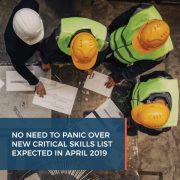DHA ISSUES DIRECTIVE CONFIRMING THE RULES AROUND SHORT TERM WORK IN SA
/in Archived, News, Xpatweb News /by xp-adminHERE IS WHAT YOU NEED TO KNOW
- An 11.2 visa will not be issued by the foreign Missions beyond three (3) months. Where an extension is required, same may be applied for in South Africa for an additional and final thee (3) months period.
- Once the required period(s) have concluded, a new 11(2) visa cannot be reapplied for within the same calendar year.
- Where the period of the visa overlaps into a new calendar year, the overlapping days will be considered part of the new calendar year.
- When filing an extension application, the DHA will calculate to ensure that the applicant does not exceed 180 days in South Africa in any given calendar year.
- This visa does not permit regular ongoing work – where such work is required, a suitable long term work visa must be applied for.
NEWS | OUR TOP TIPS FOR COMPANIES TO SECURE A CRITICAL SKILLS WORK VISA
/in Archived, News /by xp-adminThe need for foreign skills has become more and more prevalent due to skills shortages experienced globally.
We often recommend pursuing a work visa in the Critical Skills category due to the range of occupations currently on the critical skills list.
So how do you determine if an employee qualifies for a Critical Skills Work Permit?
A candidate’s eligibility can best be determined after conducting a thorough assessment of their CV, experience, qualifications and the skills they will contribute to South Africa.
The process may seem simple at the on-set, however there are a few tricky factors to take into consideration before qualifying a candidate for a Critical Skills work permit.
Experience comes in handy during this process and we share with you below our top tips –
- Know the basics
- Familiarise yourself with the Critical Skills list.
- Understand the requirements and ensure 100% compliance on each item, unless you are able to provide a compelling motivation.
- If a foreign candidate does not hold a South African long-term work permit, they will be required to file the application at the South African High Commission/Embassy within their home country.
- Know your timeframes – This is a process that requires sufficient time to be completed correctly. Applications that are not prepared properly incur unnecessary delays that could easily have been avoided. Expedited delivery is however possible where there are real business urgencies and these can be motivated.
- Ensure the occupation is on the Critical Skills list
Prior to qualifying a candidate for a Critical Skills work permit, it is imperative to ensure that the position the candidate will take up in South Africa, is on the Critical Skills list. This assessment does go a lot deeper as the position title may not match the one on the Critical Skills list and it is therefore important to review the candidate’s experience as well as the job description of the role in South Africa and ensure that the two goes hand-in-hand. After such a determination has been made, it will be easier to pin down the correct category on the list.
- Qualifications are so, so important
Although the Immigration Act states that qualifying for a Critical Skills work permit may be based on skills, qualifications and/or experience, in practice the qualifications a foreigner holds will impact on the application. Further consideration must be given in terms of occupation the applicant will be working within and whether the qualification they hold, matches their occupation.
It is important to note, the adjudicator at the South African Embassies and the Department of Home Affairs consider the qualifications and subsequently the South African Qualifications Authority (SAQA) Certificate, as a tick box item that must be provided. If you are unable to provide same, the application carries a high risk of being refused and may as such require a waiver application to formally approve the exclusion of this requirement. This is not strictly correct in law as the Act clearly states “and/or” however our recommendation would always be to comply with the requirements and requests made by the Department of Home Affairs as issuing authority. Where true merits do exist for exclusion of the requirements, the Department can always be approached to gain their support.
- Timing
Now that you have determined the foreign candidate qualifies for a visa in the Critical Skills category, and the corresponding occupation on the Critical Skills list matches the applicant to a T, how long will it take to secure the visa?
Timing is a challenge for most organisations as the foreign employee is usually needed in country “tomorrow”. The planning phase is often done to the exclusion of consideration of work visa timeframes or the business need for a certain individual is crucial and cannot wait – time is money.
When we tackle a visa application, one of our first questions (if not an initial statement from the company) is “When do you need the expat in country?”. The process is then streamlined according to the requirements of the business and it is vital to plan the process with the company, and give realistic timeframes on what is possible. Always take into consideration the time it takes to collect documents from third party processes (this includes SAQA, professional bodies and police clearances), reviewing all documents received for accuracy and compliance, compiling a legal and fully compliant work visa application and lastly the processing times of the South African Embassies/Missions abroad or the Department of Home Affairs head office where applications are filed in country.
Below a guide on a few work permit related items that do take time –
- Evaluation of foreign qualifications (SAQA)
- Processing time: 3 weeks on average (may take longer dependent on University)
- Registration with professional bodies – important to note that many professional bodies require the SAQA Certificate prior to being able to process registration
- Processing time: 1 month on average (up to 6 months dependent on occupation)
- Police Clearance Certificates
- Processing time: 1 – 8 weeks (varies based on if you apply in country or via a foreign mission)
- Processing of application by the South African Foreign Embassy/Mission
- Processing time: 4 weeks on average (a select few countries take 8 weeks)
- South African Foreign Embassies/Missions Abroad
An applicant will be required to apply at the South African Embassy/Mission within their home country or country of temporary residence (where they hold a temporary residence visa). Applicants are only permitted to apply in South Africa if they hold a long-term visa.
It is always best to contact the Embassy/Mission prior to the submission to ensure all the requirements are met. Yes, you may have a fully compliant application as prescribed by the Regulations, however some Embassies have their own specific documents they request for the Critical Skills work permit application and or a preferred format. Contacting the Embassy ahead of time will prevent any unnecessary delays where the candidate may be required to travel back-and-forth to the Embassy to provide additional documentation not in hand.
For more information please email us on contact@xpatweb.com
NEWS | ATTRACTING SKILLED IMMIGRANTS TO SOUTH AFRICA IS KEY TO GROWTH
/in Archived, News /by xp-adminMarisa Jacobs, Director, Xpatweb, says that we need to combat the misconception that foreigners take jobs from South Africans when the truth is that skilled foreigners benefit the country in multiple ways.
“The President’s State of the Nation address highlighted how important his ongoing efforts to attract more foreign direct investment into the country are.
Investors however need to know they can access the right skills here, and that they can bring some of their own key personnel into the country to oversee their investment,” she points out.
“Skilled people are the dynamos of modern economies, and as such we need to remain at the forefront of competing for and attracting scarce skills.”
Research shows that the popular view that immigrants steal jobs is simply mistaken. At a national level, the presence of immigrant workers has no significant effects on the employment of native workers.
At a national level, immigrants make a positive impact on the gross domestic product (GDP). It is estimated that immigrant workers may raise South African income per capita by up to 5 percent.
Immigrants also tend to pay more tax, notably income and value-added taxes. In 2011 immigrants’ net fiscal contribution ranged between 17 percent and 27 percent depending on the scenario used to make the calculation, whereas native-born individuals contributed -8 percent on both scenarios.
“Huge opportunities like the recently announced gas finds off Mossel Bay could kick start growth in the area and across the economy,” Ms Jacobs says.
“We should also not ignore the upside of ensuring that their skills are transferred to our people, who in turn could also offer their services worldwide, creating a stream of remittance income for the country.”
It seems as though government is relying on skilled people from outside South Africa to help turn Eskom around, another instance of how important it is to have the right conditions in place to attract skilled professionals.
Having a visa regime and overall business culture that is welcoming to immigrants is also important when it comes to positioning South Africa as the gateway to Africa, says Ms Jacobs.
“South Africa’s ability to compete for and attract critical skills globally and the projects they enable, is key to realising our growth aspirations and increasing job opportunities and economic stability.” she concludes.
AUTHOR
Marisa Jacobs
Director
NEWS | CRITICAL SKILLS LIST 2019
/in Archived, News /by xp-adminMarisa Jacobs, Director and Immigration Specialist at Xpatweb says “There is no need to panic yet!”
No need to panic
The Department of Home Affairs confirms the critical skills list will first be published in draft format and distributed for public consultation prior to finalising and legislating the new list.
The draft list is expected to be signed off by the Minister and distributed in April 2019.
Cooperation with Business to ensure a comprehensive the new list
On the one hand there is no list which will always be absolutely complete and comprehensive, in a specific place and time.
The requirements always evolve with time. Such as with the new oil and gas opportunities, we know there will be expansion in this area on the critical skills list.
“We have never failed to obtain a work permit for a foreigner where we can show that a local job is not taken and there is valid commercial rationale.” -Says Jacobs
The critical skills list is but one of various categories of obtaining a work visa.
Preview of anticipated draft list
The new list is much shorter than the current list, probably as Home Affairs saw many of the old categories not being used.
A positive development is that the draft version of the new list is more concentrated, by adding certain categories together.
The removal of the Corporate General Manager category has received much attention.
“We believe this category has been largely abused by many given rise to the proposed removal thereof.”
In its current form it is in need of a revamp.
“We agree that this category will or should not be removed in its entirety and the consultative process will provide the input required for the Department of Home Affairs to more directly and suitably define this skill and the form it should take on this list to curb abuse.” Says Jacobs
Submissions
Where anyone foresee a category not catered for, they are most welcome to email Marisa Jacobs on marisa@xpatweb.com with motivation and we will ensure that Home Affairs is made aware hereof before the list is finalized.
Also, where a category is not added under critical skills list, there are other categories under which a valid work permit can always be obtained.
AUTHOR
Marisa Jacobs
Director
FIND US
Johannesburg
17 Eaton Avenue,
Bryanston, Johannesburg,
Gauteng, 2191
South Africa
George
55 York Street
Dormehls Drift
George, 6529
South Africa
CONTACT US
Telephone:
South Africa: 011 467 0810
Postal:
PO BOX 35046
Northcliff
2115
IN THE NEWS
- Another Positive Move To Attract More Tourists To SA
- Bringing in the Bomb Squad at Home Affairs
- How Home Affairs’ Immigration Reforms Could Drive SA’s Growth in 2025
- Phindiwe Mbhele on Remote Work Visa: Splendid Cape Town is wooing more and more digital nomads
- Cape Town Shines, and So Does South Africa’s New Critical Skills Visa Overhaul





